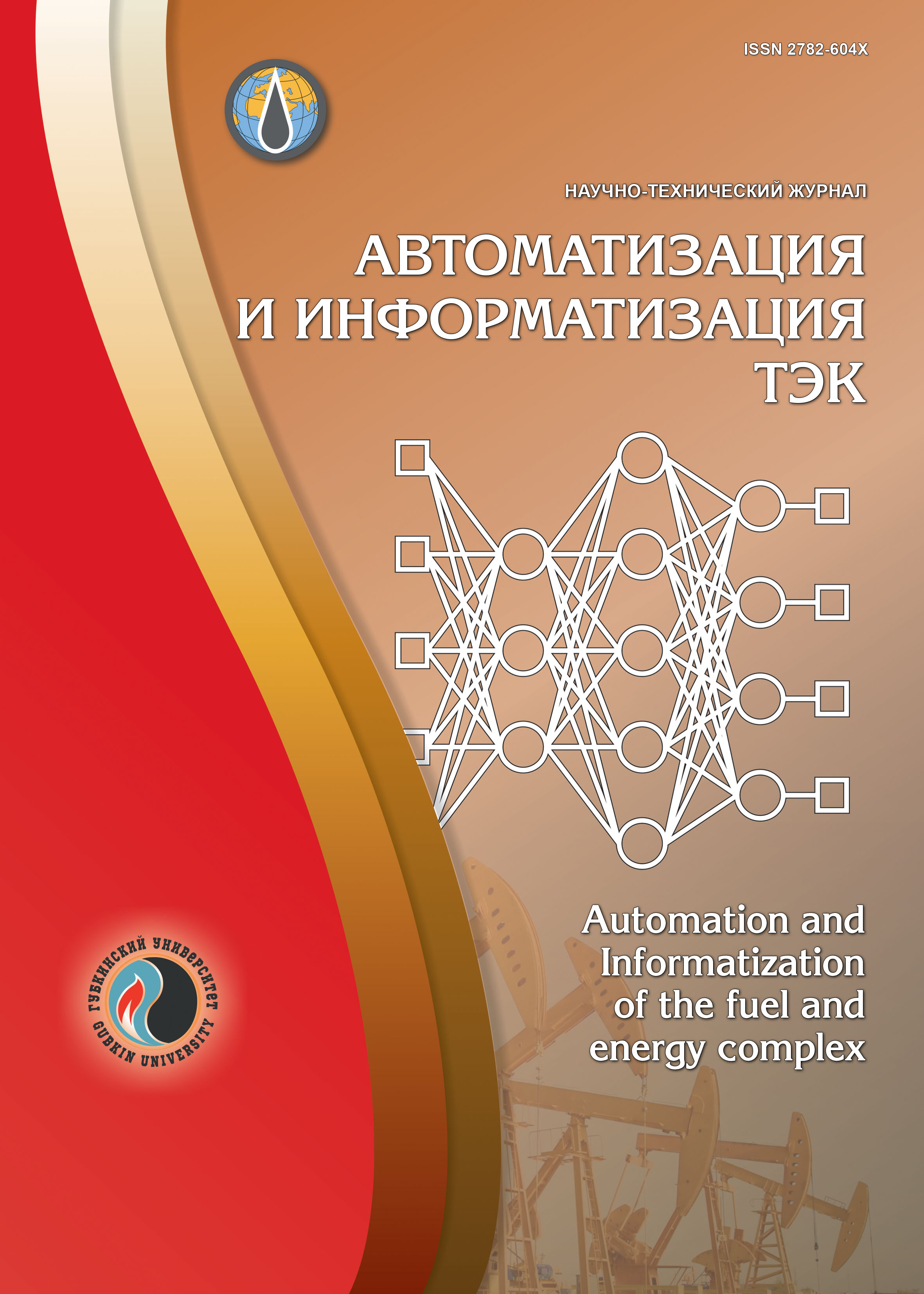Scientific and technical journal
«Automation and Informatization of the fuel and energy complex»
ISSN 0132-2222

Prediction of fuel energy volumes required for transportation of gas through the gas supply systems with the application of machine learning methods
UDC: 622.691.48+519.677+519.673
DOI: 10.33285/2782-604Х-2022-2(583)-22-27
Authors:
1 LLC "NIIgazeconomika", Moscow, Russian Federation
Keywords: machine learning methods, fuel gas, random forest, linear models, neural networks
Annotation:
One of the most relevant problems when controlling operation of gas supply systems is minimization of fuel energy volumes required for transportation of gas by gas transportation systems (GTS). Modern gas supply systems are complex engineering infrastructures, the analysis of which requires well-developed mathematical instruments and high-tech computer technologies. At present different approaches are developed to predict the volumes of fuel gas, however, the problem remains relevant and is still to be researched. The increasing volume of the data regarding actual operating modes of gas supply systems alongside with advances in computational power create conditions for a more active use of machine learning methods for solving that problem. The article discusses the application of machine learning methods for estimating fuel gas volumes usage under various modes of gas supply systems operation. It is noted, that the modeling results quality highly depends on the effective configuration of parameters of a machine learning model. The results of various models application in the framework of the problem under consideration are comparatively analyzed. Machine learning methods application allows essential reduction of time required to calculate fuel gas consumption volumes by more than 20 times on average in comparison with traditional software packages. The proposed approaches were approbated on the examples of actual sections of a gas supply system operating in a stationary mode. It is assumed, that machine learning methods coupled with already established models for hydraulic calculations can be actively used in practice for operation and optimization of operating modes of Unified Gas Supply System.
Bibliography:
1. Kontseptsiya energosberezheniya i povysheniya energeticheskoy effektivnosti OAO "Gazprom" na period 2011–2020 gg.: utv. Prikazom OAO "Gazprom" № 364 ot 28.12.2010 g.2. Khvorov G.A., Yumashev M.V., Yurov E.V. Formirovanie strategicheskikh innovatsionnykh meropriyatiy v transporte gaza kak strategicheskiy put' realizatsii potentsiala energosberezheniya v OAO "Gazprom" // Nauch.-tekhn. sb. Vesti gazovoy nauki. – 2013. – № 2(13). – S. 127–131.
3. Realizatsiya potentsiala energosberezheniya v magistral'nom transporte gaza PAO "Gazprom" / O.E. Aksyutin, A.G. Ishkov, G.A. Khvorov, G.S. Akopova // Gazovaya prom-st'. – 2017. – № S1(750). – S. 52–58.
4. Karasevich A.M., Kreynin E.V. Perspektivy i rezervy energosberezheniya v Rossii // Gazovaya prom-st'. – 2010. – № 9(650). – S. 68–71.
5. Formirovanie vysokoeffektivnykh energosberegayushchikh innovatsionnykh tekhnologiy v magistral'nom transporte gaza OAO "Gazprom" / A.G. Ishkov, G.A. Khvorov, M.V. Yumashev, Yu.N. Sinitsyn // Nauka i tekhnika v gazovoy prom-sti. – 2011. – № 1(45). – S. 12–18.
6. Energoeffektivnye rezhimy gazotransportnykh sistem i printsipy ikh obespecheniya / A.M. Karasevich, M.G. Sukharev, A.V. Belinskiy [i dr.] // Gazovaya prom-st'. – 2012. – № 1(672). – S. 30–34.
7. Sukharev M.G., Tverskoy I.V., Belinskiy A.V. Kriterii effektivnosti i optimal'nosti tekhnologicheskikh rezhimov gazotransportnykh sistem // Truboprovodnye sistemy energetiki: Metodicheskie i prikladnye problemy matematicheskogo modelirovaniya. – Novosibirsk: Nauka, 2015. – S. 334–346.
8. Otsenka potentsiala energosberezheniya v magistral'nom transporte gaza: problemy, realizatsiya, perspektivy / G.A. Khvorov, M.N. Matsuk, A.V. Belinskiy [i dr.] // Gazovaya prom-st'. – 2017. – № 7(755). – S. 76–85.
9. Berner L.I., Kovalev A.A., Kiselev V.V. Upravlenie gazotransportnoy set'yu s ispol'zovaniem metodov modelirovaniya i prognozirovaniya // Avtomatizatsiya, telemekhanizatsiya i svyaz' v neftyanoy promyshlennosti. – 2013. – № 1. – S. 48–53.
10. Berdnik A.N., Shcherbakov A.P. Energeticheskie zatraty na transport gaza po magistral'nomu gazoprovodu i puti ikh snizheniya // Uchenye zametki TOGU. – 2019. – T. 10, № 4. – S. 283–287.
11. Kislenko N.A., Belinskiy A.V., Kazak A.S. Metody, algoritmy i instrumenty modelirovaniya i optimizatsii rezhimov raboty edinoy sistemy gazosnabzheniya Rossii na osnove tekhnologiy iskusstvennogo intellekta. Chast' 1 // Gazovaya prom-st'. – 2021. – № 9(821). – S. 88–96.
12. Kislenko N.A., Belinskiy A.V., Kazak A.S. Metody, algoritmy i instrumenty modelirovaniya i optimizatsii rezhimov raboty edinoy sistemy gazosnabzheniya Rossii na osnove tekhnologiy iskusstvennogo intellekta. Chast' 2 // Gazovaya prom-st'. – 2021. – № 10(822). – S. 98–104.
13. STO Gazprom 2-3.5-051-2006. Normy tekhnologicheskogo proektirovaniya magistral'nykh gazoprovodov. – M.: IRTs Gazprom; VNIIGAZ, 2006. – VIII, 197 s.
14. Sardanashvili S.A. Raschetnye metody i algoritmy (truboprovodnyy transport gaza). – M.: Izd-vo "Neft' i gaz" RGU nefti i gaza im. I.M. Gubkina, 2005. – 577 s.
15. Sukharev M.G., Samoylov R.V. Analiz i upravlenie statsionarnymi i nestatsionarnymi rezhimami transporta gaza. – M.: Izd. tsentr RGU nefti i gaza (NIU) im. I.M. Gubkina, 2016. – 399 s.
16. Zheron O. Prikladnoe mashinnoe obuchenie s pomoshch'yu Scikit-Learn i Tensor Flow: kontseptsii, instrumenty i tekhniki dlya sozdaniya intellektual'nykh sistem: per. s angl. – SPb.: Al'fa-kniga, 2018. – 688 s.
17. Koel'o L., Richart V. Postroenie sistem mashinnogo obucheniya na yazyke Python. – M.: DMK Press, 2021. – 304 s.